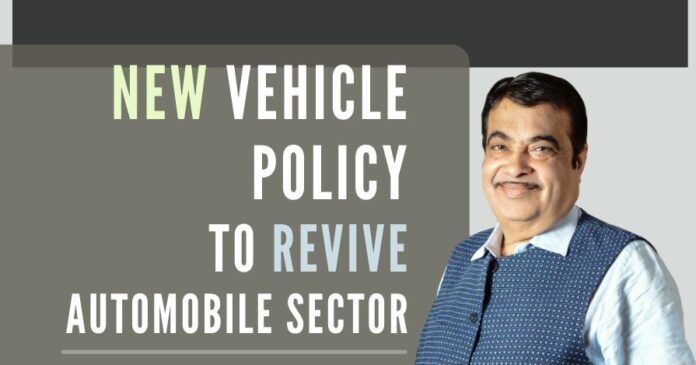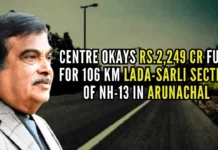
Vehicle manufacturers are advised to provide 5 % discount on purchase of new vehicle against the scrapping certificate
India on Thursday announced a new vehicle policy. Under the Government’s vehicle scrapping policy, about 5 per cent rebate on new cars would be offered to buyers on scrapping of old vehicles, Union Minister Nitin Gadkari told Parliament on Thursday and termed it a “win-win” policy that will help improve fuel efficiency and reduce pollution. Transport Ministry also issued an advisory on this matter. The voluntary vehicle scrapping policy announced in the Union Budget for 2021-22 provides for fitness test after 20 years for personal vehicles while commercial ones would require it after the completion of 15 years.
“The ‘Voluntary Vehicle-Fleet Modernisation Programme‘ or ‘Vehicle Scrapping Policy’ will offer a rebate of about 5 per cent to buyers on new car purchases in lieu of scrapping of the old. The vehicle manufacturers are advised to provide a discount of 5 per cent on purchase of new vehicle against the scrapping certificate,” Union Road Transport, Highways Minister Gadkari said while speaking in Parliament’s both houses.
The Ministry has proposed that commercial vehicles be de-registered after 15 years in case of failure to get the fitness certificate. Increased fees for fitness certificate and fitness test may be applicable 15 years onwards from the date of initial registration, according to the Minister.
“The scheme shall provide strong incentives to owners of old vehicles to scrap old and unfit vehicles through registered scrapping centres, which shall provide the owners with a scrapping certificate,” he said. Listing the incentives, Gadkari said, “Scrap value for the old vehicle given by the scrapping centre will be approximately 4-6 per cent of the ex-showroom price of a new vehicle.”
The State Governments may be advised to offer a road tax rebate of up to 25 per cent for personal vehicles and up to 15 per cent for commercial vehicles, he said. In addition, registration fees may also be waived for the purchase of a new vehicle against the scrapping certificate. He said the Ministry of Road Transport and Highways will promote the setting up of Registered Vehicle Scrapping Facility (RVSF) across India and will encourage public and private participation for the opening up of such centres.
Efforts are also being made to set up Integrated Scrapping Facilities across India, he said, adding some of the identified places include Alang in Gujarat, where it is being planned to develop a highly specialized centre for scrapping among many other potential centres, where different scrapping technologies can be synergized together. With a simplified registration process through a single window, the scrapping facility shall have to comply with environmental and pollution norms and with all applicable Acts.
It shall be ensured that the scrapping centres have an adequate parking facility, de-pollution equipment for air, water and sound pollution and adequate facilities for hazardous waste management and disposal, the Minister said. The Ministry shall promote the setting up of automated fitness centres, on a PPP model, by the state government, private sector, automobile companies, he added. The ecosystem is expected to attract additional investments of around Rs.10,000 crore and 35,000 job opportunities. This policy will result in an increase in GST to about Rs 40,000 crore, Gadkari said.
The policy is touted as a major step to boost the Indian automobile sector, reeling under the adverse impact of the COVID-19 pandemic. According to him, the policy is aimed at reducing the population of old and defective vehicles, bringing down vehicular air pollutants, improving road and vehicular safety. Besides, it will help in achieving better fuel efficiency, formalising the informal vehicle scrapping industry, and boost the availability of low-cost raw materials for the automotive, steel and electronics industry.
With the scrapping of old vehicles, raw materials such as plastic, copper, aluminium, steel and rubber will be recycled. This will bring down the cost component and help the industry become more cost-competitive. The Road Transport and Highway Ministry will publish a draft notification for stakeholders’ comments in the next few weeks. Under the policy, tentatively, rules for fitness tests and scrapping centres are likely to be applicable from October 1, 2021, while scrapping of government and PSU vehicles that are older than 15 years will be from April 1, 2022.
Mandatory fitness testing for heavy commercial vehicles is likely to be in force from April 1, 2023, and the same will be in place in a phased manner for other categories from June 1, 2024. The Minister said there are 51 lakh light motor vehicles that are older than 20 years and 34 lakh light motor vehicles that are older than 15 years. Around 17 lakh medium and heavy commercial vehicles are older than 15 years without a valid fitness certificate, Gadkari said, adding older vehicles cause 10 to 12 times more pollution than fit ones. A vehicle failing a fitness test or failing to get a renewal of its registration certificate may be declared as ‘End of Life Vehicle’.
The Ministry has proposed that commercial vehicles be de-registered after 15 years in case of failure to get the fitness certificate. Increased fees for fitness certificate and fitness test may be applicable 15 years onwards from the date of initial registration, according to the Minister. Another proposal is that private vehicles be de-registered after 20 years if found unfit or in case of a failure to renew the registration certificate. Increased re-registration fees will be applicable 15 years onwards from the date of initial registration. Addressing the media, Gadkari said about 100 scrapping centres would be made operational in the next two years.
[with PTI inputs]











Brain dead scheme as usual to just get the headlines, its similar to the 5 day Bhajan scheme by finance ministry during covid of announcing nothing but spending few hours per day reading scripts to retired TV audience , assume a cheap car of 5 Lakhs bought 15 years ago, now if you are replacing it you spend 5 Lakhs again. The discount is ” About 5%” a term only available with Indian babus it is NOT equal to or mandatory 5%, 5% of 5Lakhs is 25000 Rs. If the vechicle to be replaced, if its still in working condition its utility value is more than 25000 offered as a discount. Only brain dead will apply. A car is normally sold at far less than the recommended retail price. The notion of the scheme is old is worth less, old is worth less only if it is NOT maintained properly, instead of enforcing regular maintenance most fitness tests are only on paper
Developed countries have a better scrapping policy, not only to vehicles but also industrial machinery to have a vibrant economy. In Japan, 3 year cars are shipped out which are used in Africa and Middle East. The west offers 50%, 30%, 20% depreciation for three years for industrial machinery. For ex You will will find second hand printing presses from Germany extensively used which are as good as new and available at 30% cost.
Biggest advantage of the policy is massive employment for semi skilled traders. But it is the duty of government to provide scrap grave yards to entrepreneurs at designated places which can be seen in Hollywood movies. How many are aware that biggest ship breaking yard in world is at Alang in Gujarat, as ships older than 15 years are stripped here.
But what we require is scrapyard for politicians having more than 30 years of political life. They should be made as supervisors at old age homes.unfortunately india has above 50 year olds designated as youth leaders.
Why selective policy to revive only one sector? Govt should also come up with ideas to revive home furnishing sector, clothing sector, utensils sector etc and order the whole population of India to scrap these items and get 5 % discount on purchase of new item. If donated, discount will still be 5%.
One must first clarify what types of vehicle are covered by the vehicle policy.
Does it apply to scooters!
Who knows, bicycles and bullock carts used in the rural areas may soon be affected. After all bhakts need a job.
Wonder if one will see extensions for the tenure given because of constant lockdowns during which vehicles cannot be used freely. If Coca Cola can get Covid, why not vehicles!
Only Singapore has such a policy for cars and these cars beyond the expiry date are exported to other countries which still use them.
Forgot to mention about the Spares market.
This will end up businesses and jobs lost for millions.